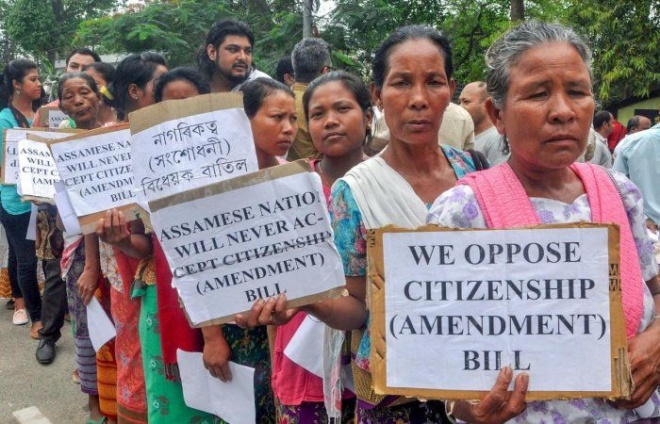TLI Staff
New Delhi: Following the Presidential assent, the controversial Citizenship Amendment Bill, 2019 has become law. Soon after the bill was passed by Rajya Sabha, considered a hurdle given that BJP does not have majority on its own in the House and possibility of some allies not supporting it, it triggered violence in parts of North Eastern states especially in Assam and Tripura.
Many areas have been under curfew and at least three people have died in police firing. So, why is the law considered controversial and why is it causing violent protests? Let’s see it in this edition of the Explained.
What is the law all about:
The law grants citizenship to illegal migrants who have come from three neighbouring countries of Pakistan, Bangladesh and Afghanistan over the last few decades after they faced discrimination and persecution on the grounds of their religions.
The law grants citizenship to only those illegal migrants who are Hindus, Sikhs, Buddhists, Christians, Parsis and Jains. Muslims are not to be provided Indian citizenship.
Who are illegal migrants?
An illegal migrant is a person who enters India without valid travel documents, like a passport and visa, or enters with valid documents, but stays beyond the permitted time period.
How many illegal immigrants are living in India?
The government currently does not have credible data on this but it is suggested that they are in millions. They comprise people from all religions. A few millions are understood to be Muslims who came from Bangladesh especially after 1971 war with Pakistan and liberation of Bangladesh. A majority of them crossed the border in search of better livelihood and jobs.
While they are almost in every part of the country their concentration is in the states of Assam, Tripura, West Bengal and Bihar. Following the enactment of Citizenship Amendment Bill, they face jail, detention and expulsion.
Why violent protest is taking place in Assam, Tripura and other parts of the country?
Illegal migrants are not Muslims alone. There are millions of Hindus, Christians, Sikhs and Buddhist refugees too. They are living in Assam, Tripura and other North Eastern states besides West Bengal and Bihar. Once they get citizenship, they will be considered at are with any other Indian national and will benefit from government schemes, apply for jobs and buy properties.
The indigenous people in the North East fear that this will affect their social composition, culture, language and take away jobs. Not only that, the illegal migrants after getting citizenship would outnumber them and make them minority in their own land.
How does the law address the concerns of North-Eastern people?
It exempts certain areas in the North-East from the law. The law excludes illegal migrants residing in areas covered by the Sixth Schedule of the Constitution, that is, notified tribal areas in Assam, Meghalaya, Mizoram and Tripura. The amended law also excludes the Inner Line Permit areas.
Inner Line Permit regulates the entry of persons, including Indian citizens, into Arunachal Pradesh, Mizoram and Nagaland. With apprehension of protest from Manipur, the Inner Line Permit has been extended to it.
What is the main opposition from Congress on the bill?
The main opposition party Congress has dubbed the law against the idea of India as it is discriminatory against one religion (Muslims). It has argued that Article 14 of the Constitution guarantees equality to all persons, including citizens and foreigners. The controversial law classifies illegal migrants based on their country of origin and religion they follow.

